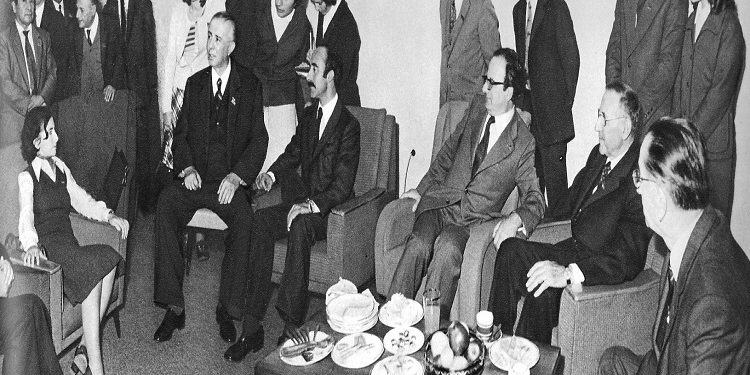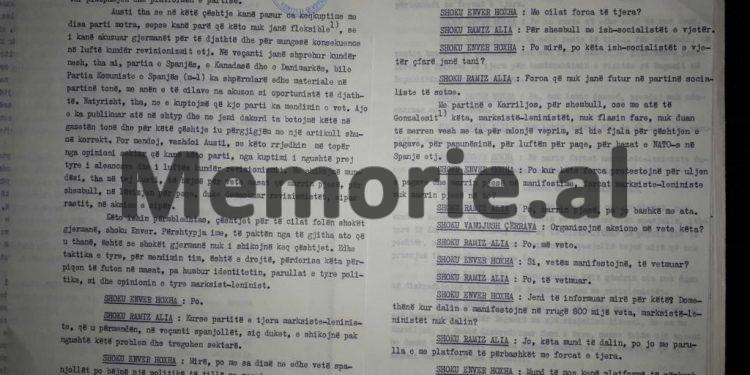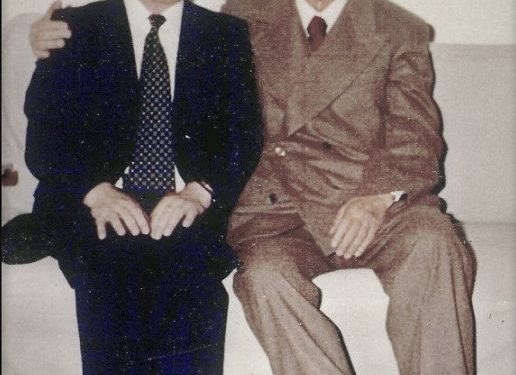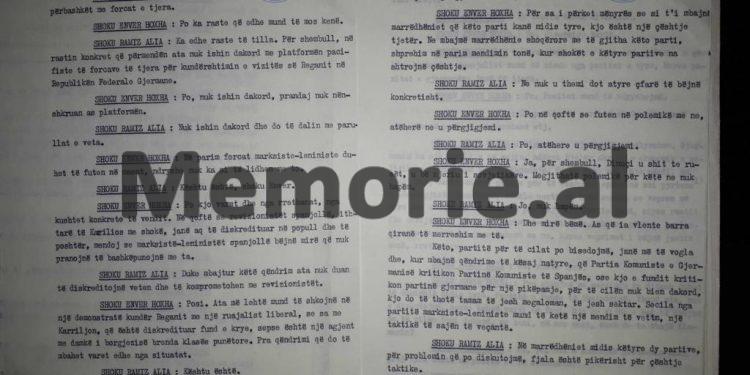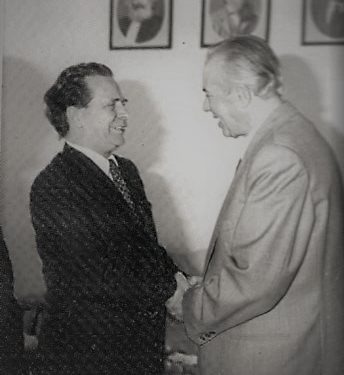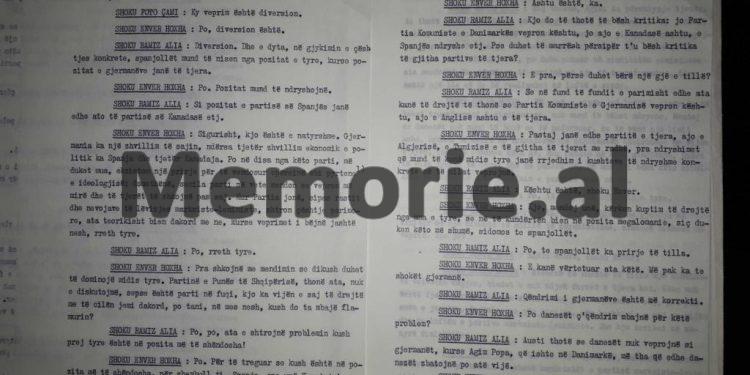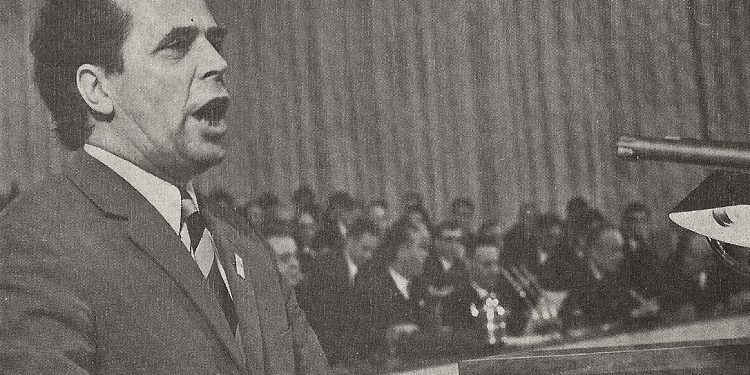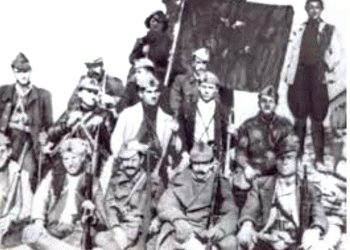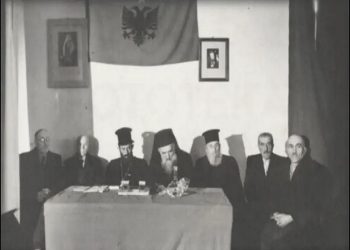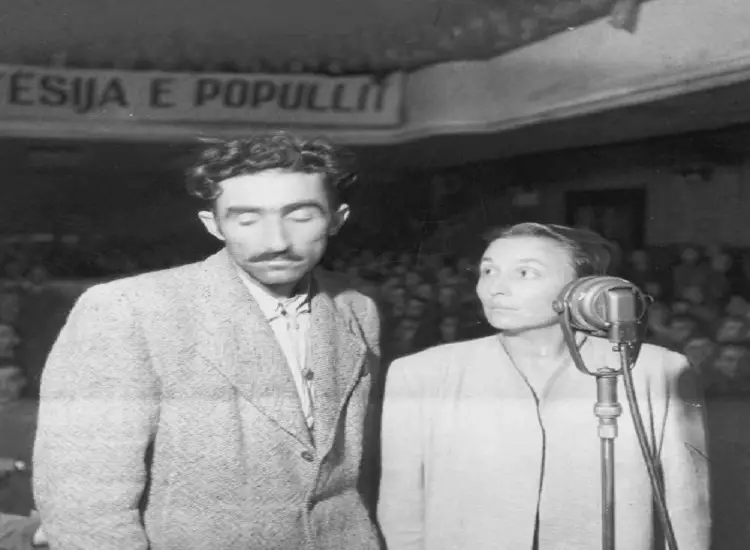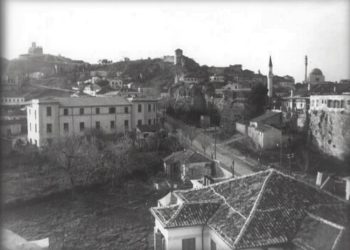Dashnor Kaloçi
The third part
Memorie.al/ publishes some archival documents extracted from the Central State Archive in Tirana (Fund of the former Central Committee of PPSh), which contain the acronym “Secret” and “Top Secret” and belong to a period from January from 1982 until September 1983, where there is a voluminous file with minutes of meetings of the Secretariat of the Central Committee and the Political Bureau of the Central Committee of the PPSh, meetings which were chaired by its General Secretary, Enver Hoxha, where they assisted: Ramiz Alia, Adil Çarçani, Manush Myftiu, Hekuran Isai, Rita Marko, Pali Miska, Hajredin Çeliku, Haki Toska, Simon Stefani, Lenka Çuko, Muho Asllani, Vangjel Çerrava, etc., as the main topic is analysis about the “hostile activity” of Mehmet Shehu and his close collaborators, from Fadil Paçrami, Todi Lubonja, Beqir Balluku, Petrit Dume, Hito Çako, Abdyl Këllezi, Koço Theodhosi, Kiço Ngjela, Vasil Kati, Kadri Hazbiu, Fiqret Shehu, Feçor Shehu, Mihalla q Ziçishti, Llambi Peçini, etc. In the file available to Memorie.al, in addition to the analysis of the “hostile activity of the police agent Mehmet Shehu and his associates Beqir Balluku and Kadri Hazbiu”, in the meetings of the Political Bureau and the daily meetings of the Secretariat of the PPS Central Committee, are analyzed also the activity of the Ministry of Internal Affairs and State Security, with its agency and collaborators, inside and outside the country, the reports and relations of the Albanian state with different countries of the world, such as: the USA, the Soviet Union, West Germany, England, Spain, Italy, as well as those with neighbors, such as Greece and Yugoslavia and the demonstrations in Kosovo, how the world press presented Socialist Albania, the talks with West Germany about the War reparations payments, meetings and conversations with party leaders Marxist-Leninists from different countries of the world, such as Ernst Aust, Zhoao Amazonas, Fosko Dinuçi, etc., regarding the “suicide of Mehmet Shehu”, the problems of Polish immigration Albanian refugees, in different countries of the world, and the change of the exchange rate of the dollar in the remittances, which they made to their relatives in Albania, up to numerous economic problems, from heavy industry, hydropower plants on the cascade of the river Drin, energy import and export, etc., etc.
Continues from last issue
The secret document with the minutes of the daily meeting of the secretaries of the Central Committee of the PPSh, held on May 15, 1982, regarding the meeting of Ramiz Ali with Ernest Aust, chairman of the Marxist-Leninist party of West Germany
DAILY MEETING OF SECRETARIES OF THE CENTRAL PARTY COMMITTEE MAY 15, 1982
SECRET
COMRADE RAMIZ ALIA: We cannot tell them what to do specifically.
COMRADE ENVER HOXHA: But if they get into a controversy with us, we will respond.
COMRADE RAMIZ ALIA: Yes, we will respond to you.
COMRADE ENVER HOXHA: Here, for example, Dinuçi was sold to the Soviets, but we did not open a controversy about him.
COMRADE RAMIZ ALIA: No, we did not open.
COMRADE ENVER HOXHA: And we did well, because it wasn’t even worth the rent burden to deal with him. These parties we are talking about are smaller, and when they take a position of this nature, that the Communist Party of Germany criticizes the Communist Party of Spain, and vice versa, that means being a complete megalomaniac. Each of the Marxist-Leninist parties can have its own opinion.
COMRADE RAMIZ ALIA: In the relations between these two parties, it is a matter of tactics.
COMRADE FOTO CAMI: But since the Spaniards have distributed materials, they have not done well.
COMRADE RAMIZ ALIA: By doing this, the Spanish have not acted rightly.
COMRADE FOTO CAMI: This action is a diversion.
COMRADE ENVER HOXHA: Yes, it is a diversion.
COMRADE RAMIZ ALIA: Diversion, and the second in judging the concrete issue, the Spanish can start from their positions, while the Germans have other positions.
COMRADE ENVER HOXHA: Yes, positions can change.
COMRADE RAMIZ ALIA: Like the positions of the Spanish party, there are also those of Canada, etc.
COMRADE ENVER HOXHA: Of course, this is natural. Germany has its own development, while Spain has another political-economic development, and Canada has another.
But in some of these parties, it seems to me that there is a tendency to place superiority over the purity of ideology, that is, each party thinks it is doing well and wants others to follow it.
When our Party raises theoretical questions about Marxism-Leninism, they theoretically agree with us, but they do practical actions outside of us.
COMRADE RAMIZ ALIA: Yes, it is true.
COMRADE ENVER HOXHA: So they go with the opinion that someone should dominate among them. We do not discuss the Albanian Labor Party, they emphasize, because it is the party in power. And this has its line, but now between us, who will carry the flag?!
COMRADE RAMIZ ALIA: Yes, yes, they pose the problem of which of them is in the most sound positions.
COMRADE ENVER HOXHA: Yes, to show who is in better positions, e.g. you Spain or me Canada.
COMRADE RAMIZ ALIA: Yes, yes, there are many such problems.
COMRADE ENVER HOXHA: That’s right, there are many.
COMRADE RAMIZ ALIA: This means criticizing, not the party of Spain acts like this, not Canada like that, or Denmark differently. Why should you criticize all parties?!
COMRADE ENVER HOXHA: Why should such a thing be done?!
COMRADE RAMIZ ALIA: At the end of the day, they also have the right to say that the Communist Party of Germany acts like this, or England acts like that.
COMRADE ENVER HOXHA: Then there are other parties such as that of Tunisia, Algeria, and so on. And the differences between them are as a concrete consequence of the conditions in which they operate.
COMRADE RAMIZ ALIA: That’s right, Comrade Enver.
COMRADE ENVER HOXHA: This, I think, requires deep understanding on their part since they can fall into positions of megalomania like the Spanish fell.
COMRADE RAMIZ ALIA: Yes, the Spanish have such tendencies.
COMRADE ENVER HOXHA: Yes, they have proven this. The German friends have less.
COMRADE RAMIZ ALIA: The attitude of the Germans is the most correct.
COMRADE ENVER HOXHA: And the Danes, what is their position on this problem?!
COMRADE RAMIZ ALIA: Austi says that the Danes do not act like the Germans, while Agim Popa, who was in Denmark, said that they follow the same line.
COMRADE ENVER HOXHA: Yes, it is, and it should be, since they have neither the strength nor the opportunity to create other unions or to blow up the existing ones. Well, can these be blown up with one turn of the key?!
COMRADE RAMIZ ALIA: As I said Agimi, there is a different impression. He says that the information that the Germans have about the Danes is not correct because it is not true that the Danes hold those views. The point of view of the Danes is to work with the existing union and this is achieved in the ongoing struggle.
COMRADE ENVER HOXHA: In the ongoing work and in the ongoing war, the trade unions will be transformed. I think the Danes are not so immature as to put a time limit on transforming their unions. The point is that when you get into these unions, you have to get your party’s influence on them.
COMRADE RAMIZ ALIA: Yes, to create their influence.
COMRADE ENVER HOXHA: And then when you see that the situation has reached such a suitable situation, you go on the attack, don’t you?!
COMRADE RAMIZ ALIA: That’s right, Comrade Enver?!
COMRADE ENVER HOXHA: And under these conditions, that union automatically listens, obeys, and does not follow other forces, in vain. This is not about the title of the union or about its name, but about its obedience and union in a front with the Marxist-Leninists. And this is achieved dialectically.
COMRADE RAMIZ ALIA: When this moment comes, the members of the trade unions will support more the candidates of the Marxist-Leninist party, and not their leaders.
COMRADE ENVER HOXHA: This is the reason why Marxist-Leninist forces enter the trade unions. Even Ernst Austi, for this reason, enters.
COMRADE RAMIZ ALIA: That’s what it’s for.
COMRADE ENVER HOXHA: Is it included, or is it not included, for this purpose?!
COMRADE RAMIZ ALIA: Yes, as he says, for this purpose he enters.
COMRADE FOTO ÇAMI: The conditions have not yet been created for Marxist-Leninists to create their own trade unions in these countries.
COMRADE HEKURAN ISAI: Unions are an economic force.
COMRADE ENVER HOXHA: Unions have funds, insurance, pensions. He really holds Albanian citizenship, the Girokastrite who lives in the United States of America, however does not return to Albania, because he loses his pension.
I have my pension here, he says, and if I go back I lose it, so I can’t come. Therefore, if the Germans and the Danes do not understand correctly the issue that they should join the unions, they will make a big mistake. The social reality itself does not allow you to think and act differently.
COMRADE HEKURAN ISAI: Creating new unions without creating the new system is difficult.
COMRADE ENVER HOXHA: Yes, new unions must be created, but this happens if you have authority. Otherwise it is difficult.
COMRADE RAMIZ ALIA: Eight million members, there are German trade unions.
COMRADE ENVER HOXHA: This is, as I said, a very important moment in there, it would give the party the opportunity to make people its own, and lead them.
COMRADE HEKURAN ISAI: The member of the existing trade union must be interested in succeeding the Marxist-Leninists.
COMRADE ENVER HOXHA: There must be interest. The greatest interest is that of securing peace, the war against imperialism, against armaments. Look how the German people act?! In a pacifist way, but he feels the danger of war, only that he does so, under the influence and direction of those who have a policy different from that of the Marxist-Leninist forces.
Simple Germany does not want armaments, but does not go further than supporting the balancing of armaments. People don’t like it the war, however, they feel its danger, more so for the reason that the forces are not balanced. But the imperialists have found other methods to lead the peoples to war. That much, they know.
In Europe, it is fought over who rules over each other, who gets here and who gets there. Penetration in the masses then brings these, or here or there. And they go out on the streets only for the balancing of armaments, and although they know that this is something partial, they still do not follow all the slogans of the German Communist Party (Marxist-Leninist).
COMRADE RAMIZ ALIA: No, they don’t follow them.
COMRADE ENVER HOXHA: If they were to come to this conclusion, no one stops them from demonstrating in the streets, since there is a certain bourgeois democracy there, which allows them to protest.
COMRADE RAMIZ ALIA: Yes, yes. In the end, Comrade Enver, Ernst Austi asked about Mehmet Shehu’s case. You, he said, may not give an answer but I am putting it to you as a matter. We will give you answers, for any clarification you will ask for, I told him, that we are talking here among friends.
Austi told me that he raised this issue, because when this event happened, our communique was read, but among the friends of Albania and the friendship associations, some questions have arisen: How did this happen?! Why did he kill himself?!
Questions arose for us, Austi continued, especially since many of his materials were removed, such as the report he gave at the VIII Party Congress, etc. In other words, we thought there was something here, he emphasized, since his burial was also not held with ceremony. We read your press, but we also read a lot of foreign press speculation on this issue.
COMRADE ENVER HOXHA: Yes, there was a lot of speculation about this case.
COMRADE RAMIZ ALIA: He said that, among other things, they had read (apparently he had not read this, but had heard it from the Germans who work on our radio), that the Party has criticized Mehmet Shehu, for some mistakes in the line of her. He was talking about his problems in the family, and because of this, he said, Mehmeti killed himself.
We think, continued Austi, that if this fact is so and if we told the workers in Germany, they would support the Albanian Labor Party and say: “The comrades in Albania are doing very well, since the Prime Minister, and criticize, for views or actions that are contrary to the Party’s line”.
Ernst Austi condemned the act of suicide, and described it as hostile to the Party. But since the communiqué did not give anything, this created difficulties for us, he emphasized.
COMRADE ENVER HOXHA: There are also state secrets, more Aust (comrades present at the meeting, laugh). Memorie.al
The next issue follows




